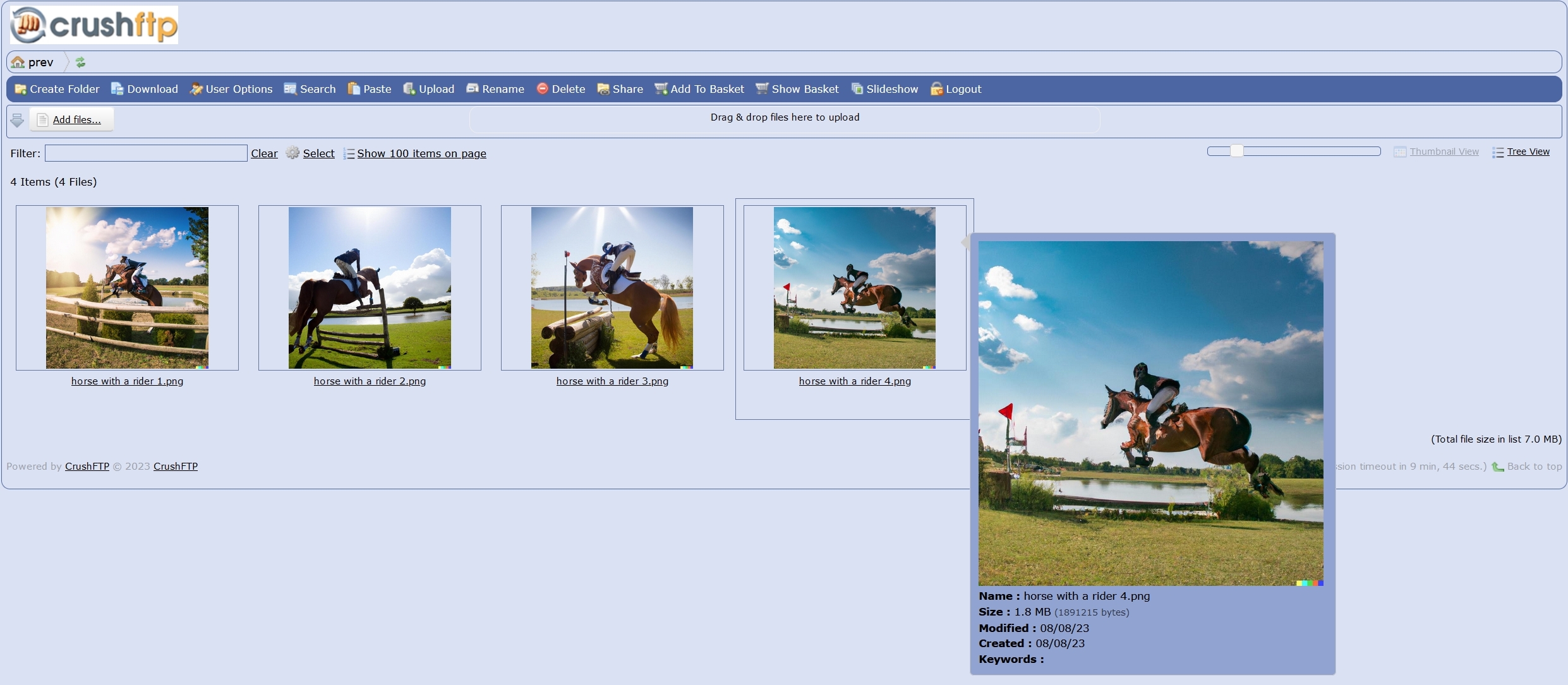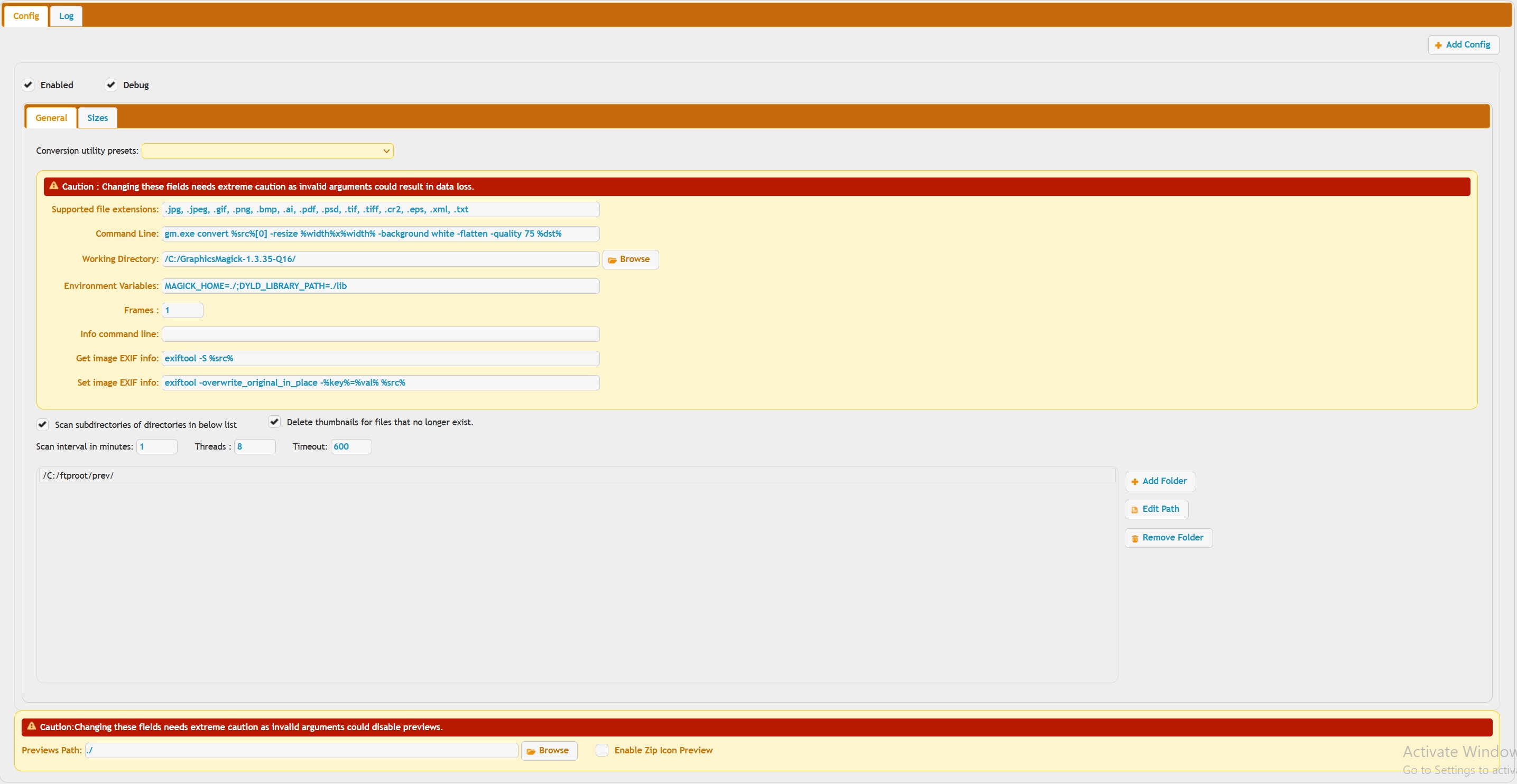The Preview feature, when enabled allows displaying the user file list in Thumbnail View mode, for most popular image, document and video file formats.For documents, a thumbnail image of the
first (usually title) page is rendered, for videos, 10 slides evenly sampled along the duration time.
Prerequisits:
Thumbnails generation relies on widely used free 3rd party conversion utilities. CrushFTP renders the thumbnail list, but it doesn't include no native media conversion code to generate these, except the conversion scheduler. This latter we call the Preview Scanner component. The required external media conversion utilities are either part of the host operating system (in case of Mac OS), can be downloaded from the OS apps repository ( Linux yum and apt), or as a standalone package from the maintainer's site (Windows, all OS). In case of Windows and Linux the conversion utilities need to be deployed manually.
Image and document files:
On Linux platforms need to deploy GraphicsMagick for image formats and also Ghostscript for documents. On Debian based platforms the packages are readily available from the apt repository
On Red Hat/CentOS and usually other RPM based distros, can be installed from the EPEL repository. Download the latest epel-release rpm from
Install epel-release rpm:
Install GraphicsMagick the package:
Alternatively, can try to use ImageMagick still, the v6.x version line if available, is stable. The v7.x version line however may not be.
Ghostscript has been on all major Linux app repositories for long, can simply install it like
On Windows platforms will need to user GraphicsMagick mandatorily, for the recent versions of ImageMagick will not work with Java no more. There are options, either use the binary installer, or use the portable .zip package and deploy it somewhere.
External links to maintainer's download page
GraphicsMagick http://www.graphicsmagick.org/download.html
Ghostscript https://ghostscript.com/releases/gsdnld.html
On Mac OS platforms usually don't need to do nothing, the conversion utility is readily available, need to use the qlmanage preset, it will work out of the box.
Video files:
On Linux, need to install ffmpeg from the official app repository, depending on the distro, with apt, yum or dnf, like
On Windows need to download from the maintainer either the binary installer and run it, or the portable .zip package then unzip it somewhere on the host. External link to maintainer's download page:
FFmpeg: https://ffmpeg.org/download.html
On Mac OS platforms usually don't need to do nothing, the conversion utility is readily available, need to use the pcastaction preset, it will work out of the box.
EXIF data (optional):
We can display additional information under the thumbnails on hover, if exiftool is deployed. It's not a mandatory component, but if needed, on Linux can install it from the apps repository, on Windows, download the binary from https://exiftool.org/ , drop it into the GraphicsMagick binary's parent folder. On Mac OS, need to download and install from the dmg package.
, drop it into the GraphicsMagick binary's parent folder. On Mac OS, need to download and install from the dmg package.
Setting it up:
Once the prerequisites are fulfilled, choose the appropriate preset from the Conversion utility presets dropdown list.
In some cases the automatic Working directory path may be inaccurate, in that case, use the right side Browse button to locate the installation directory of the media conversion utility.
Then in the lower half of the Preview config page, use the Add folder button to browse for the user data directory to be processed by the Preview Scanner. This usually is the top level directory of all user VFS data directories.
Holding down the Alt key while click the Add Folder button allows adding remote items (FTP://, SMB3://, etc.)
So the top half of the window in general you don't touch or change anything. Just use the preset menu. The bottom half of the window, you specify directories that CrushFTP should monitor for new files. When it sees a new file, it generates a thumbnail for that file.
 |
Prerequisits:
#
Thumbnails generation relies on widely used free 3rd party conversion utilities. CrushFTP renders the thumbnail list, but it doesn't include no native media conversion code to generate these, except the conversion scheduler. This latter we call the Preview Scanner component. The required external media conversion utilities are either part of the host operating system (in case of Mac OS), can be downloaded from the OS apps repository ( Linux yum and apt), or as a standalone package from the maintainer's site (Windows, all OS). In case of Windows and Linux the conversion utilities need to be deployed manually.Image and document files:
#
On Linux platforms need to deploy GraphicsMagick for image formats and also Ghostscript for documents. On Debian based platforms the packages are readily available from the apt repository
apt-get install graphicsmagick
http://dl.fedoraproject.org/pub/epel/[your redhat version here]/x86_64/
rpm -Uvh epel-release*rpm
yum install graphicsmagick
apt-get install imagemagick
apt-get install ghostscript
External links to maintainer's download page
GraphicsMagick http://www.graphicsmagick.org/download.html

Ghostscript https://ghostscript.com/releases/gsdnld.html

On Mac OS platforms usually don't need to do nothing, the conversion utility is readily available, need to use the qlmanage preset, it will work out of the box.
Video files:
#
On Linux, need to install ffmpeg from the official app repository, depending on the distro, with apt, yum or dnf, like
apt-get install ffmpeg
On Windows need to download from the maintainer either the binary installer and run it, or the portable .zip package then unzip it somewhere on the host. External link to maintainer's download page:
FFmpeg: https://ffmpeg.org/download.html

On Mac OS platforms usually don't need to do nothing, the conversion utility is readily available, need to use the pcastaction preset, it will work out of the box.
EXIF data (optional):
#
We can display additional information under the thumbnails on hover, if exiftool is deployed. It's not a mandatory component, but if needed, on Linux can install it from the apps repository, on Windows, download the binary from https://exiftool.org/ , drop it into the GraphicsMagick binary's parent folder. On Mac OS, need to download and install from the dmg package.
, drop it into the GraphicsMagick binary's parent folder. On Mac OS, need to download and install from the dmg package.
Setting it up:
#
Once the prerequisites are fulfilled, choose the appropriate preset from the Conversion utility presets dropdown list.
 |
In some cases the automatic Working directory path may be inaccurate, in that case, use the right side Browse button to locate the installation directory of the media conversion utility.
 |
Then in the lower half of the Preview config page, use the Add folder button to browse for the user data directory to be processed by the Preview Scanner. This usually is the top level directory of all user VFS data directories.
Holding down the Alt key while click the Add Folder button allows adding remote items (FTP://, SMB3://, etc.)
So the top half of the window in general you don't touch or change anything. Just use the preset menu. The bottom half of the window, you specify directories that CrushFTP should monitor for new files. When it sees a new file, it generates a thumbnail for that file.
Add new attachment
Only authorized users are allowed to upload new attachments.
List of attachments
| Kind | Attachment Name | Size | Version | Date Modified | Author | Change note |
|---|---|---|---|---|---|---|
png |
preview1.png | 91.0 kB | 2 | 29-Dec-2020 05:25 | Ben Spink | |
png |
preview2.png | 29.6 kB | 2 | 29-Dec-2020 05:25 | Ben Spink | |
jpg |
preview_config1.jpg | 469.3 kB | 1 | 08-Aug-2023 15:23 | Ada Csaba | |
jpg |
preview_config2.jpg | 183.6 kB | 1 | 08-Aug-2023 15:23 | Ada Csaba | |
jpg |
preview_log.jpg | 1,215.8 kB | 1 | 08-Aug-2023 20:16 | Ada Csaba | |
jpg |
preview_main.jpg | 751.2 kB | 2 | 08-Aug-2023 15:26 | Ada Csaba | |
jpg |
usermanager_config1.jpg | 303.0 kB | 1 | 08-Aug-2023 19:57 | Ada Csaba | |
png |
webinterface_folders.png | 469.3 kB | 2 | 29-Dec-2020 05:25 | Ben Spink |
«
This particular version was published on 08-Aug-2023 18:03 by Ada Csaba.
G’day (anonymous guest)
Log in
JSPWiki